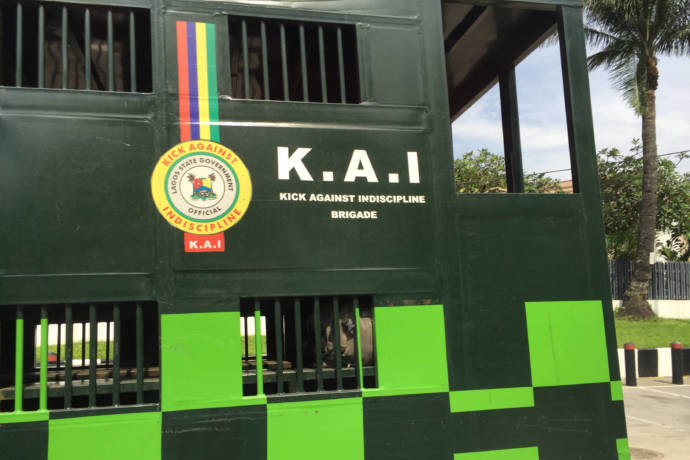The KAI Initiative: A success or still a work in progress?

The Kick Against Indiscipline (KAI) initiative is essentially an environmental law and sanitation unit established by the Lagos State Government to handle and curb all forms of illegal environmental practices, as well as ensure the adherence to sanitation laws in the state.
You may not recognize this unit by this name though, because while KAI was created in 2003, it was reformed and revamped to now the Lagos State Environmental Sanitation Corps (LAGESC) in 2017 under the regime of former Governor Akinwumi Ambode. LAGESC has since been made into an agency, as officials are now considered civil servants.
The purpose of this initiative was essentially to clean up Lagos and maintain decorum, and some of the most popular tasks these officials are responsible for is ensuring that pedestrians use the overhead bridge, instead of crossing the road.
Another famous task LAGESC officials are known for is preventing the cooking and sale of foodstuff and food items on the roads or sidewalks, as well as preventing auto mechanics from operating by the roadside.
These officials have other duties, but the above-mentioned ones are highlighted because they concern the average Lagosian.
With this initiative having been in effect for close to 21 years, how successful has it been?
The task of ensuring Nigerians use the overhead bridge more, can be said to be a resounding success as not only do Lagosians now overwhelmingly use overhead bridges, they also understand the purpose of it. They understand the safety that overhead bridges can guarantee, and they see it as more beneficial to use it, even when crossing the road would seem faster.
One Lagosian interviewed in Oshodi said LAGESC has done a good job of sanitizing the area, as the state of Oshodi now cannot be compared to what it was before. The Lagosian, who admitted to passing through Oshodi on a daily basis, said the initiative has been successful in their bid to clean up the area.
Another Lagosian said the initiative has been successful in getting people to use the overhead bridge more often, and went on to say that he uses the bridge whenever he sees one, regardless of how far it is, as it is safer for him and others
One Lagosian mentioned that elderly people may find it a bit difficult climbing the stairs attached to the bridge, and highlighted that perhaps that may be the only challenge in getting everyone to use the overhead bridge, but still reiterated that the bridge is much safer, encouraging other Lagosians to embrace the use of overhead bridges in many parts of Lagos.
“Yeah the pedestrian bridge is OK, but if you look at in terms of old people, people that are older, the staircase, most of them, you know, they’re old, they’re slow. But they’d still prefer to cross rather than using the staircase. But for the young people I think it’s good. Maybe [crossing can be tolerated for] people that have leg issues,(like those who need crutches), but i’d still encourage it (the overhead bridges)”
There is a proverbial elephant in the room though, regarding clearing traders from the road.
Where do they go? Where do the many traders that are cleared from the roadsides and sidewalks go?
When asked about the clearing of roadside traders, these are the words of a concerned Lagosian.
“They’re regulating the road sellers too, I don’t know, so before regulating them, there’s supposed to be a plan, like where are those people going to stay, you’re not just kicking them out of their spot and you’re not giving them any other space to stay, so that’s just it about them. They need to find another spot for them, you can’t just clear people. Most of them this is their only means of living, so you can’t just clear them from there and say don’t stay here again and you’re not giving them anything, it’s not…it’s not fair. I’d say Lagos State Government is trying, but they should improve on the well-being of people, the people they’re regulating.”
The easy part is clearing people from the roadside, but to actually solve the problem, you have to address why they were on the roadside in the first place.
As of 2022, Lagos had 15.3 million people, making it one of the most populous Nigerian states, yet it is one of the smallest in land area. This means the state is massively over-populated, with areas like Oshodi, Ojodu, Ikorodu and some other areas bearing the brunt of this overpopulation.
This then means that the available spaces to sell goods and foodstuff is incredibly limited. Unemployment remains a massive problem, so many Lagosians turn to buying and selling (petty trading) to make ends meet. This ultimately drives them to set up their shops wherever they can, and they can’t always find places away from the roadside.
This creates a problem that the state is responsible for solving.
Getting them off the roadside is needed, but getting them a better place to set up their market is the other part of the equation. Otherwise, these sellers are left in limbo, and before long, they may find themselves back at the place they were chased from, simply because they have nowhere to go.
One lagosian had something to say about this, and he believes it’s not the responsibility of LAGESC to worry about where these expelled traders will go. He says people should do the right thing, which includes not selling their wares on the sidewalks.
He emphasizes that when people are defaulting, they should be removed. He goes on to say that if the government waits to find a place to house all of them, they will not get anything done.
“We can always ask for better. But to me they have tried because there’s always that tendency of forcing people to do the right thing, meanwhile it’s still our duty to do the right thing but some of us [do] not. So paying someone to even [force] you to do the right thing, you can give kudos to the government,” he said when asked about the issue of where the roadside traders go.
This is one way to look at it.
It is true that LAGESC is not responsible for finding a place to contain these roadside traders, but Lagos State Government is responsible, and the government should look into potential solutions.
People need to make ends meet and put food on their respective tables, and sometimes – many times – it is only through petty trading that this can be done.
So LAGESC (formerly KAI) can be said to have been successful in many of their duties, like cleaning up the street and ensuring people use the overhead bridge, but the problem of unemployment and where petty traders will operate in Lagos still looms large, and while it is not one for LAGESC to solve, it is one the state government is definitely responsible for.





